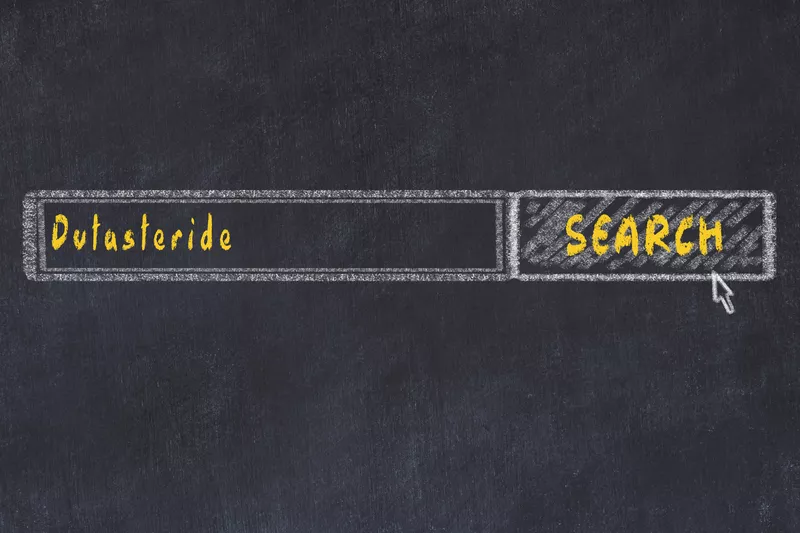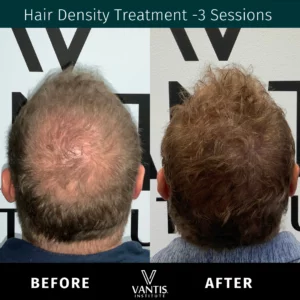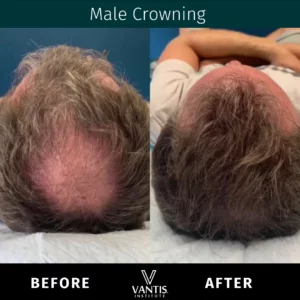Finasteride vs. Dutasteride for Hair Loss: Which Hair Loss Treatment is Better?
Finasteride and Dutasteride are arguably the most popular hair loss treatments on the market, with the former expected to globally exceed $130 million in market value by 2026.
In fact, these two drugs are a large recurring revenue stream for telemedicine companies who specialize in helping men have commonly-requested prescriptoin medications delivered to their door:
“Just two years after launching, Hims has reached $100 million in annual subscription revenue and is growing so fast that it expects to reach $250 million in recurring revenue by the end of 2020, according to a recent sales pitch to investors that was viewed by CNBC. The average monthly order size is $45 and, at a time when investors are hyper-focused on profitability, Hims says in the presentation that it has a 60% gross margin, or the percentage of revenue left after subtracting the cost of goods sold.”
But when it comes to biohacking hair loss and improving your appearance, “popular” isn’t always better.
And this article will show you exactly why this is the case when it comes to both hair loss drugs. Something not even your average hair loss practitioner might know about!
What Are Dutasteride And Finasteride, Exactly?
Dutasteride and Finasteride are drugs specifically designed to treat the problem of hair loss, but doctors and scientists will commonly refer to them as 5AR (5-alpha-reductase) inhibitors.
Here’s a brief explanation of why this matters from hair loss…
(Source)
Finasteride () and Dutasteride (Avodart) work off the idea that DHT (dihydrotestosterone) is the primary culprit for hair loss:
- Testosterone in your body is converted into DHT through an enzyme known as 5-alpha-reductase
- DHT then binds to androgen receptors on your hair follicles’ cells
- The rate of hair follicle growth is slowed down and the follicles themselves start to shrink as a result
A greatly oversimplified explanation but it’s all you need to know for now.
Where the drugs Dutasteride and Finasteride come in is through blocking the activity of the 5-alpha-reductase enzyme, which therefore blocks the conversion of testosterone into DHT in your body. Less DHT = less hair loss.
If you’re wondering what the difference is between the two drugs, there are only a few you need to know about:
- Finasteride was FDA-approved to treat male pattern hair loss in 1997, whereas Dutasteride is used off-label to treat the same condition
- Both drugs are approved by the FDA for the treatment of benign prostate hyperplasia (BPH)
- Both drugs have a similar side effect profile, with Dutasteride appearing to be slightly better in treating hair loss
- Dutasteride inhibits two types of 5-alpha-reductase while Finasteride inhibits just one, which some scientists believe explains why it is 3 to 100 times more potent at reducing DHT levels
So given that these drugs have been given out in the tens (if not hundreds) of millions over the past 20 years, why would one want to avoid using them to fix hair loss problems?
3 Reasons to STOP Using Finasteride and Dutasteride
For Dutasteride and Finasteride, the risks associated with taking these medications are often greater than the benefits they claim to provide. And sometimes the benefits are not as great as promised.
Here are five key reasons why you may want to second-guess using either of these popular hair loss drugs.
Reason #1: Your Sex Life Will Be Ruined
This is not a joke or a funny suggestion.
Even as early as 2011, a large review of double-blind, randomized, placebo-controlled trials investigating the use of 5-alpha-reductase inhibitors found the following side effects as a result of using them:
- Lowered libido
- Reduced ejaculatory function
- Diminished erectile function (getting and staying fully erect)
- Decreased sexual desire for one’s partner
One of the lead authors even went as far as to say the sexual dysfunction can persist for months – and possibly years – after one stops using these hair loss drugs:
“For those men, it’s a life sentence… No sex. No desire. Potential depression… some experience it more drastically than others”
“I am not worried about those who stop taking the drug and get their life back, [my concern is] about those who stop taking the drug, but they don’t get their life back… As a physician you have a responsibility to take the time and explain to your patient that maybe not everyone will have these side effects, but you may, and in some cases they are irreversible”
This finding was replicated in 2017 when a Northwestern Medicine study evaluated men ages 16-42 who used 1.25 mg of Finasteride a day (or more) at least once:
“Among men 16–42 years old and exposed to finasteride ≤1.25 mg/day, 34 of 4,284 (0.8%) developed PED (persistent erectile dysfunction)… Of 103 young men with new ED, 34 (33%) had new PED. Young men with >205 days of finasteride exposure had 4.9-fold higher risk of PED than men with shorter exposure.”
We’re not saying there’s a 100% chance this will happen to you. It’s around 1% or so for the men who use Finasteride or Dutasteride for 90 days (or more) to treat long-standing hair loss.
But just ask yourself if this is the type of risk you’re okay with.
Reason #2: You Have To Use Them Forever
Finasteride and Dutasteride are what you would call “commitment” medications: You need to use them every day for a long period of time before you can see visible results.
The Independent Pharmacy presents a rough timeline of what patients should expect when using either hair loss drug:
“You will normally start to see a difference in your hair loss around three to six months after you start to use Finasteride, so it’s important to remember to be patient when using this medication. In some men, it may take longer.
By around 12 months into treatment, you will see an improved increase in hair thickness and hair regrowth.
Some Finasteride users have reported experiencing an increased shedding of hair during the first couple of months of use. This initial shedding can last for a few months, but should stop by three to six months in”
It’s literally the same problem you encounter when you use Minoxidil for hair loss, which makes you wonder what’s the point of having an alternative solution in the first place.
And the science is clear about what happens if you stop taking Finasteride or Dutasteride:
“If you’re genetically prone to male pattern baldness, this can mean that the DHT will once again start to affect your hair follicles, resulting in thinning of the hair on your scalp, hairline recession and other male pattern baldness effects… the hair loss prevention effects of finasteride stop once people stop using the drug.
Finasteride isn’t a lifetime cure — instead, it’s a treatment that you need to keep taking if you want to stop hair loss for good.”
Not a great sell so far!
Reason #3: They Work For SOME People, But Not Forever
As with any drug on the market, there are certain people who should either avoid using it or will not get the results they are hoping to experience.
In the case of Finasteride and Dutasteride, the following people should stay away from using them:
- Those with allergies to 5-alpha-reductase inhibitors
- Patients with severe liver and/or bladder problems
- People under the age of 18 years old
- Pregnant women (and men who are trying to conceive)
- Individuals who are pre-disposed to severe depression
And even then, the experience of hair restoration physician Dr. Robet Bernstein suggests the efficacy of either drug may wane over time:
“Although finasteride will usually continue to work as long as you take it, it may lose some of its efficacy over time. Generally after about 5 years we may notice that the patient’s hair is starting to thin again and we will increase the dose slightly.
It is important to understand that even if someone thins on finasteride it doesn’t mean the medicine is not working, because they might have thinned much more without it. To my knowledge, there are no studies that have looked at the effects of finasteride for such an extended period of time.”
So let’s get this straight… even though you have to TAKE the drug forever this is no 100% guarantee it will WORK forever.
And if you don’t get the results you want, you have to cope with an awful hairline versus a slightly worse hairline if you were taking the drugs consistently.
Vantis Follicle Replication: The Best Replacement For Dutasteride and Finasteride
If you have to seriously think about the risks of a hair follicle restoration process before you do it, then it’s probably not the choice for you.
Many people in Newport Beach seek hair restoration when all other options have failed and so do many people across the United States.
But there’s one option where people get the results they want and never have to look back: Vantis Follicle Replication.
Here are just some of the reasons why you might want to make the switch:
- No side effects related to your sexual performance or your mood
- 4-6 treatments at most, rather than take an expensive pill every day for the rest of your life
- A beautiful, natural-looking hairline that can last against water, the weather, and harsh conditions
- Gone are the days of strangers asking you about your suspicious-looking hair transplant
By using a non-invasive and non-surgical technique to naturally deposit plant-based pigments in alignment with your own genetic distribution of hair, you get the hairstyle that fits YOU!
And even with immediate results seen after just one treatment, a few more is all it takes to seal the deal and move on with the rest of your life .
When you’re ready to stop worrying about your sexual health and follow a provenprocess that doesn’t mess up your hormonal health, here are 3 easy ways we can help you…
- Visit our hair loss clinic in Newport Beach, California and receive a Free Consultation with a Vantis hair loss expert.
- Call or text (949) 577-6531 to talk to one of our VFR expert practitioners now
- Receive a virtual consultation via Zoom, Facetime, WhatsApp, GoogleMeet or Skype to answer all of your questions and develop a personalized treatment plan to achieve your desired results. Schedule your FREE consultation here




